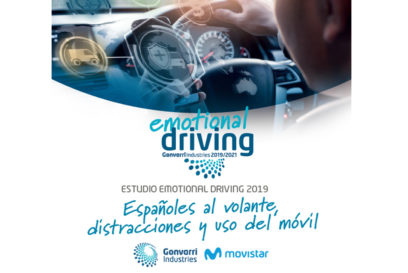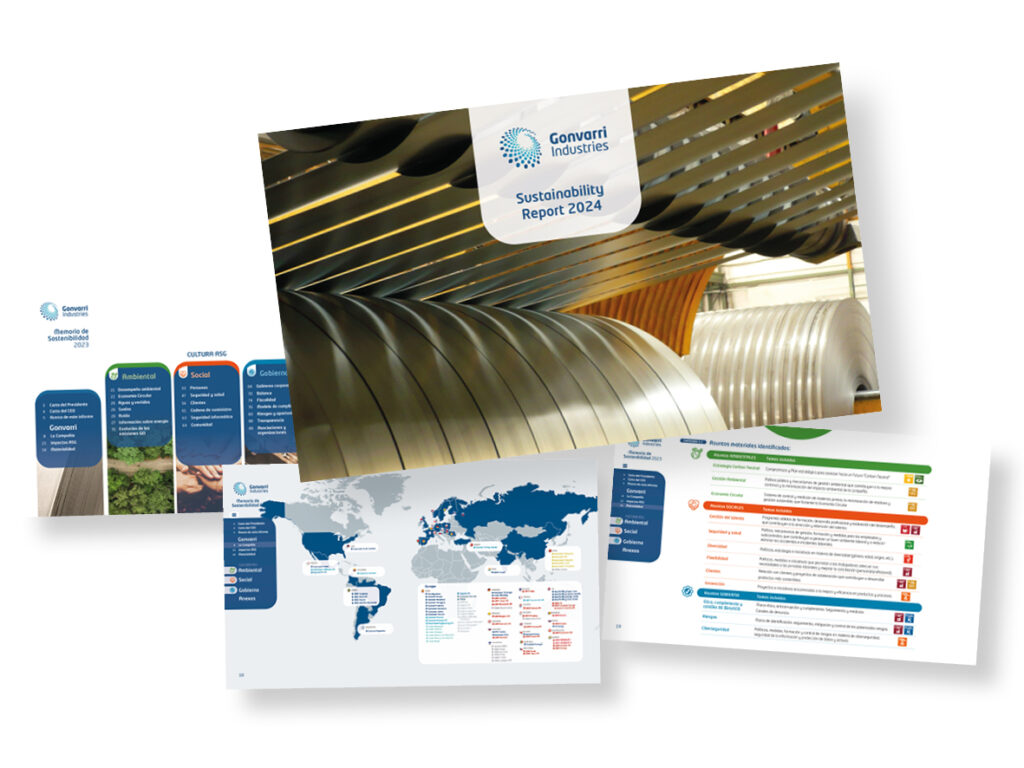Gonvarri and Movistar present the second study, Spaniards at the wheel, distractions and use of mobile phones
84% OF DRIVERS BELIEVE THAT ACCIDENTS COULD BE HALVED IF TECHNOLOGY PREVENTED THE USE OF MOBILE PHONES AT THE WHEEL.
– More than 85% believe that technology can help them to drive more safely.
– According to 9 out of 10 Spaniards surveyed, mobile phones are the main cause of distraction at the wheel.
– Men aged 25 to 44 are the most distracted at the wheel.
– Texting or Whatsapping while driving is the most risky or dangerous action related to mobile phone use at the wheel according to the Spaniards surveyed.
– 2.37 seconds is the average time drivers think they can spend on the phone without losing their attention on the road and running into danger, rising to 3.55 seconds in the case of 18-24 year olds.
– This year the study includes a section on cyclists and the road. 40.43% of drivers believe that cyclists risk their lives when riding alongside motor vehicles, and 30.70% think that cyclists do not have the same rights to ride on the road as motor vehicles.
– The least distracting aspects at the wheel are: carrying pets or listening to the radio.
Madrid, June 19, 2019 – The aim of the second study carried out by the companies Gonvarri and Movistar is to determine distractions in general and the use of mobile phones at the wheel in particular, as well as to contribute to raising awareness of road safety.
The vast majority of Spanish drivers, 85.71%, believe that technology can increase their safety on the road: 90.58% believe that it would reduce accidents by half if it prevented driving under the influence of alcohol, drugs or tiredness. And 84.13% believe that the reduction would occur if technological advances prevented hands-free use of mobile phones at the wheel.
Spaniards at the wheel, distractions and mobile phone use reveals that 54.37% of drivers admit that a distraction at the wheel has ever put them in danger. And almost 1 in 4 Spaniards say they have had a minor incident or scare as a result.
According to 9 out of 10 Spaniards surveyed – women to a greater extent – the mobile phone is the main cause of distracted driving.
The study provides a scale of distractions caused by mobile phones at the wheel:
1. Writing text messages or Whatsapp while driving, the most risky or dangerous action related to the use of mobile phones at the wheel.
2. Reading news while driving and searching for information on a mobile phone are on a par with each other.
3. Taking photos or videos
4. Reading text messages or Whatsapp.
Drivers do not see this as dangerous:
5. Talking on a mobile phone hands-free while driving.
6. Checking GPS
7. Selecting music.
People who drive fewer kilometres per year consider all of these actions to be more dangerous than the rest.
2.37 seconds is the average time Spaniards believe it is possible to be on the phone at most without losing attention on the road and running into danger, with this perception rising to 3.55 seconds in the case of the youngest (18 to 24 year olds), i.e. about 120 metres at a speed of 120 kilometres per hour, or in other words, a distance greater than that of a football pitch.
2 out of 10 respondents say that they have ever been told to stop using their mobile phone in the car while driving, with the majority being men and aged between 18 and 35.
Distracted driving
As for distractions independent of mobile phone use: 76.98% of Spaniards say that they are usually distracted when driving, with the youngest, those aged 35 to 44, and men, being the most likely to say that they do not pay attention to driving.
The risks at the wheel recognised by those surveyed are as follows:
1. Mobile phones
2. Tired driving
3. Disrespectful or aggressive driving
4. Using GPS
5. Thinking about other things
6. Eating or drinking while driving, weather conditions, routine, or smoking.
On the other hand, the least distracting aspects at the wheel are: driving with pets or listening to the radio.
Motivations for safer driving:
The main reason that makes 82.49% of Spaniards surveyed (especially women, those who drive few kilometres per year and those who use utility cars) drive more safely and responsibly is the fear of having an accident.
This is closely followed by the responsibility of taking people with them and thinking about their family. Thus, 6 out of 10 respondents say that they have at some point lifted their foot off the accelerator when thinking of a particular person, thinking that “the important thing is to get there”.
Other reasons that carry less weight are: the risk of a fine, the risk of losing their car and keeping their licence points.
It is worth noting the high percentage of respondents, more than 80%, who say that they have never received any information or training on road safety after obtaining their licence.
Cyclists:
The study shows that Spaniards at the wheel respect the safety distance when overtaking cyclists.
And they point out that 7 out of 10 Spaniards agree that cyclists have the same rights to circulate on the road as motor vehicles, although 40.43% of them believe that they risk their lives when doing so and 28.87% believe that they can coexist without any problem.
A remarkable 30.70% of those surveyed (mainly women) stated that cyclists do not have the same rights to ride on the road as motor vehicles and that they should ride on other roads.
On the other hand, 60% of Spaniards are clear about the different cases of cyclists being run over on the road: it is the drivers who are to blame (59.82%) (mainly men). However, half believe that it is the state of the roads (51.44%) and a high percentage (44.25%) believe that cyclists are to blame (those aged 25 to 34 to a greater extent). Just 11.31% believe that these are one-off incidents and there is no problem of coexistence.
Responsible driving:
More than half of those surveyed consider that in Spain people do not drive responsibly and safely, however, things change when they are asked personally about their driving, so the vast majority of those surveyed (91.27%) say that they do drive correctly.
6 out of 10 say that they drive in the same way when driving alone or with other family members, etc.
It is worth noting that 4 out of 10 Spaniards (men and those who drive more kilometres per year to a greater extent) think that it is impossible not to break speed limits.
And 3 out of 10 think it is very unlikely that they will have an accident.
18% (men and over 55) consider that moderate alcohol consumption does not affect their reflexes when driving.
More than 10% say that the rules are there to be broken. A similar percentage said that even if they consult their mobile phone, they are in full control of their driving. And 8% admit to driving aggressively, and 62% of Spanish drivers think that it is inevitable that they will be reckless at the wheel.
About Gonvarri and Emotional Driving
Emotional Driving, Gonvarri’s road safety programme in 2014, aims to raise awareness among society as a whole to drive more responsibly and safely.
Gonvarri Industries has 43 factories in 19 countries from which it supplies metal solutions for the automotive and road safety sectors. Gonvarri Industries has 6,000 employees and achieved revenues of €3.5 billion in 2018.
For more information www.gonvarri.com and www.emotionaldriving.com.
Movistar and the responsible use of technology
The study ‘Emotional Driving: Spaniards behind the wheel, distractions and mobile phone use’ is part of Movistar’s commitment to digital wellbeing, according to which the operator understands that technologies should be used to improve people’s lives. In line with this, Movistar, through its portal www.dialogando.com.es to promote the responsible and safe use of the Internet and connected devices, is developing numerous awareness campaigns such as “Love Story”, on identity theft on the Internet; “Domino”, on the importance of stopping cyberbullying; “#MyGameMyName”, on respect and tolerance in the gaming environment and #TenemosLike, to help families connect with their children through technology.



